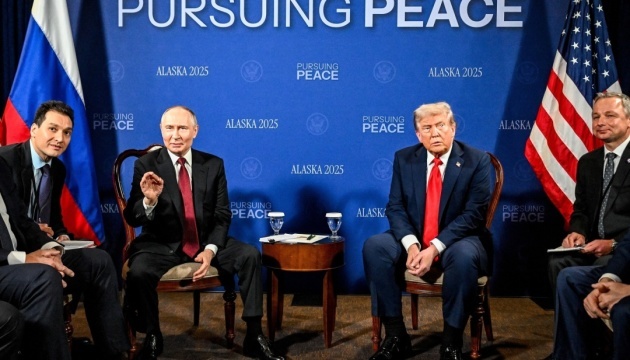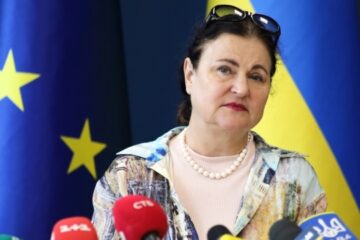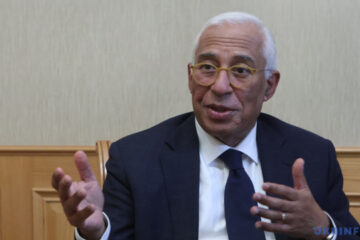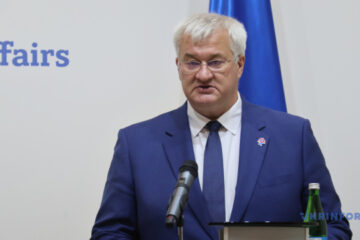
Trump’s refusal to accept Putin’s de facto ultimatum on Ukraine can be considered the only positive outcome of the bilateral meeting in Alaska, although it also became a PR victory for the Kremlin.
This was stated by Hungarian expert András Rácz, who represents German Council on Foreign Relations (DGAP), in an exclusive comment to Ukrinform.
“The most important – and probably the only – result of the Anchorage meeting is a negative one, namely that no agreement was reached. In other words, a new Yalta could be avoided, even though Russia was pushing for it. While there is a Russian offer on the table, Trump did not accept it without asking Ukraine and her European allies,” the analyst explained.
“Hence, disaster could be avoided, in which concentrated European and Ukrainian diplomacy have played key roles,” Rácz noted.
“Ahead of the Anchorage meeting both the US and Russia echoed elevated expectations, which created the impression in the outside world that a negotiated, swift end of the war would be possible,” the expert said.
In his opinion, this did not happen, as agreeing about Ukraine without Ukraine at the table could not bring a sustainable peace by definition. “Despite the complicated situation on the frontline, Ukraine is not defeated at all, and her key European allies stand firm near Kyiv. Hence, in fact, it was never more than an illusion that any bilateral US-Russian deal could bring the war to an end. Kyiv is simply not in a situation in which she would have to unconditionally obey, whatever the aggressor and the US agree upon,” Rácz said.
He also added that the Ukrainian constitution prevents President Zelensky to agree to any territorial swap, something that apparently both the US and Russia have apparently ignored.
Thinking that a “new Yalta” could work stems from the lasting, systemic underestimation of Ukraine’s own ability to shape the events, the expert said.
“A mistake that Russia committed in February 2022 and keeps committing since then,” he said.
According to the Hungarian expert, the US clearly demonstrated its military power during the meeting in Alaska, in a classic, 19th century “great power politics”-way.
“Making the Russian President march among lined-up F-22 fighter-jets with a B2 stealth bomber flying over was a clear demonstration of military might. So was the last-minute, unilateral move to prevent a one-to-one Trump-Putin meeting (which could have been dangerous taking into account the manipulative skills of the Russian president) and change the format into a three-on-three, with key advisors and foreign ministers also present,” he said.
While such unilateral, assertive moves would hardly be present in times of peace, under today’s circumstances it is indeed positive that the US was willing to openly demonstrate her might to the Russian delegation, he noted.
“Strength is the only language that the Kremlin understands and appreciates, and the US was ready to show strength,” Rácz said.
At the same time, Russia showed it was not ready for any meaningful compromise: “The offer Putin reportedly presented to Trump is not a compromise-based settlement, but basically an ultimatum that would deprive Ukraine of her key defensive lines, cement in most of the territorial losses, while in exchange Kyiv would get nothing else than a few square kilometers of devastated land and vague Russian promises about not attacking again”.
He believes that for Russia “the meeting was a significant PR success”.
“Putin could ease his isolation from the West – anyways, he was received on US territory, despite the aggression he has been leading since 2014 and despite all the sanctions and punitive measures. He could air his propaganda messages unopposed, and could do so without making even the slightest bit of concession. Russia did not even stop the air attacks against Ukraine ahead of and during the meeting. Moreover, by agreeing to meet Moscow could – at least, temporarily – avert the introduction of the new sanctions by which Trump threatened in July,” said the expert, adding that Russian domestic media praised Putin and pictured the meeting as “the well-earned rehabilitation of Russia’s great power status”.
“All in all, Alaska was a significant PR victory for the Kremlin both at home and abroad, which came with practically no costs,” the expert summarized.
As reported by Ukrinform, President Volodymyr Zelensky stated that Russia has shown no sign that a trilateral meeting involving the leaders of Ukraine, the United States, and Russia will take place. He reaffirmed that the Constitution of Ukraine prohibits the surrender of any territory.
Presidents Volodymyr Zelensky and Donald Trump are scheduled to hold talks on Monday, August 18, at the White House. Finnish President Alexander Stubb, NATO Secretary General Mark Rutte, British Prime Minister Keir Starmer, and European Commission President Ursula von der Leyen are also expected to take part in the discussions.
Source: Though disaster could be avoided in Alaska, it was still a Russian PR-victory – Hungarian expert



